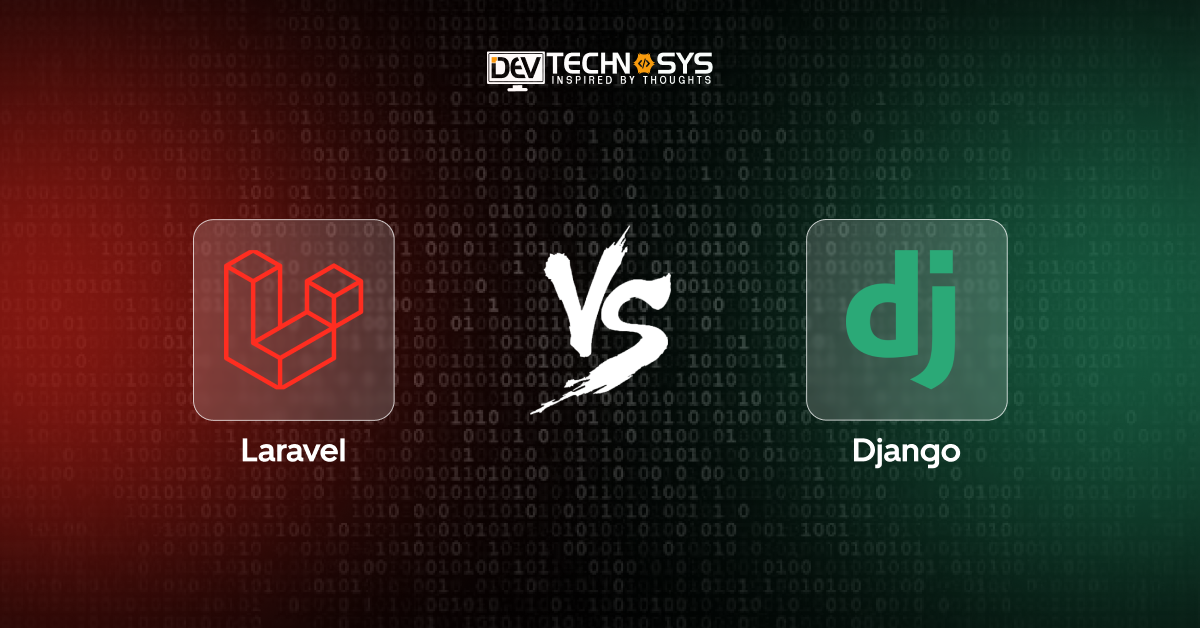“Backend Battle Begins”
When we talk about technologies, there are various names that come to mind, but choosing the right technology is necessary to build high-quality and successful applications. In this modernized world, Laravel and Django make their own place as best backend frameworks. Are you confused about which one you have to select? Just stay with us to select the right technology.
Laravel, which is built on PHP, is noted for its attractive syntax, built-in tools, and active developer community. Django, which is powered by Python, focuses on quick development, security, and clean code design.
In this blog, we will explore Laravel Vs Django, which is the best framework for backend development, and Laravel and Django use cases.
What is Laravel?
Laravel is a prominent open-source PHP web application framework noted for its attractive syntax and powerful capabilities for developing scalable, contemporary online apps.
Taylor Otwell created Laravel in 2011 using the Model-View-Controller (MVC) architecture, with the goal of making the development process quicker and more effective without losing application functionality.
Laravel development has become the preferred framework for PHP developers thanks to its extensive ecosystem, developer-friendly tools, and strong community support.
Key Features and Strengths of Laravel
Let’s take a look at the Laravel advantages and strengths:
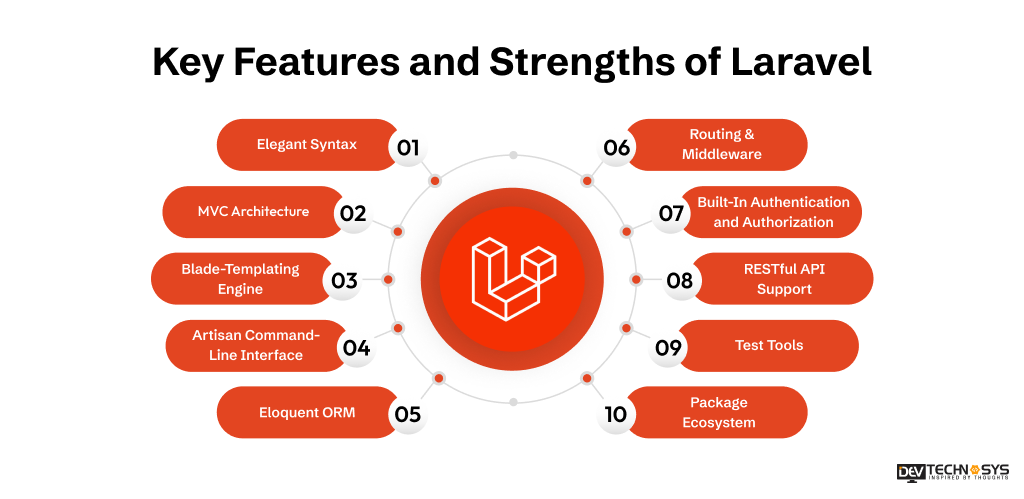
1. Elegant Syntax
Laravel focuses on clean, legible code, making it easier for developers to create and manage applications.
2. MVC Architecture
It uses the MVC paradigm to separate the business logic, data, and presentation layers, which enhances code organization and scalability.
3. Blade-Templating Engine
Blade enables dynamic content presentation using simple and powerful template syntax that supports code reuse and layout inheritance.
4. Artisan Command-Line Interface
Artisan is Laravel’s command-line tool for automating repetitive activities like as migrations, testing, and package development.
5. Eloquent ORM
Laravel’s ORM simplifies database interactions by using expressive and intuitive syntax to manage connections, queries, and transactions.
6. Routing & Middleware
Laravel has powerful routing and middleware features for controlling request flow, as well as implementing custom filters and authentication.
Interested in a chatbot demo, pricing, or more info? Fill out the form our expert will contact you shortly.
-
Chatbot Demo
-
Cost to Develop an app
-
Industry Report
-
Case Study
7. Built-In Authentication and Authorization
It has pre-configured tools for login, registration, password resets, and role-based access control.
8. RESTful API Support
Laravel makes it simple to create scalable APIs with Resource Controllers and API routes.
9. Test Tools
Laravel security features PHPUnit integration and assist methods for creating successful unit and feature tests.
10. Package Ecosystem
Tools such as Laravel Nova (admin panel), Horizon (queues), and Sanctum or Passport (authentication) greatly enhance its capabilities.
Use Cases and Industries
Laravel is extremely versatile and can power applications across various industries. Here are some typical use cases:
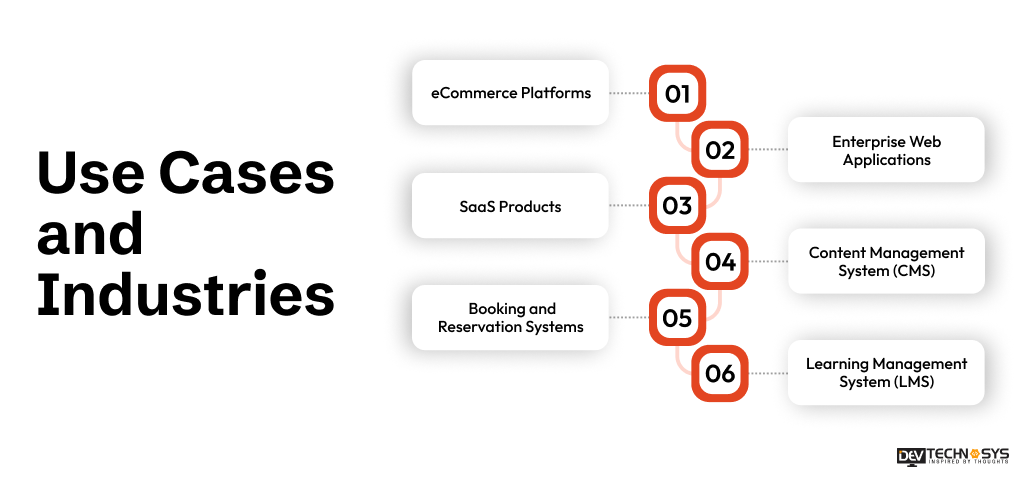
1. eCommerce Platforms
Laravel is perfect for developing customized eCommerce solutions that include complex features such as shopping carts, payment gateways, inventory management, and user dashboards.
Hire Laravel developers to construct customized online stores that grow effortlessly, providing smooth experiences for both customers and administrators across a variety of retail industries.
2. Enterprise Web Applications
Laravel enables the creation of sophisticated enterprise-level systems such as CRMs, ERPs, and intranet portals. Laravel for enterprise applications makes it an excellent solution for major businesses looking for scalable, safe, and easily maintainable software to handle internal processes, workflows, and data analytics.
3. SaaS Products
Laravel is popular for constructing Software-as-a-Service applications because it has built-in support for user authentication, subscription payment, and RESTful APIs.
It’s ideal for startups and technology organizations developing cloud-based systems for project management, collaboration, analytics, and business automation.
4. Content Management System (CMS)
Laravel enables the development of customized CMS platforms that surpass the constraints of off-the-shelf systems such as WordPress.
With complete control over features, user permissions, media handling, and design, it caters to businesses that require specialized content processes, such as media, education, and government organizations.
5. Booking and Reservation Systems
Laravel powers real-time booking platforms with automatic alerts, calendar connections, and payment processing, covering everything from hotel bookings to event tickets and transportation scheduling.
According to the web development company, its powerful backend structure can handle large user traffic and assures seamless operations for travel, hotel, and event-based enterprises.
6. Learning Management System (LMS)
Laravel is an excellent framework for constructing LMS systems that include courses, quizzes, progress tracking, and certificates.
Its adaptability allows for different user roles and sophisticated content structures, making it perfect for educational institutions, corporate training programs, and e-learning companies that focus on personalized and scalable solutions.
What is Django?
Django is a high-level, open-source web framework written in Python that encourages quick development and clean, pragmatic design. Django was created in 2005 by experienced developers at a news agency with the goal of assisting developers in swiftly developing safe, stable online applications.
It adheres to the Model-View-Template (MVT) architectural pattern and has a “batteries-included” mentality, which means it offers the majority of the components required to develop a fully functional application right out of the box.
In 2025, Django tutorial is a popular choice among developers and organizations that value security, scalability, and performance, particularly for data-driven or content-heavy online applications.
Key Features and Strengths of Django
Let’s take a look at the Django advantages and strengths:
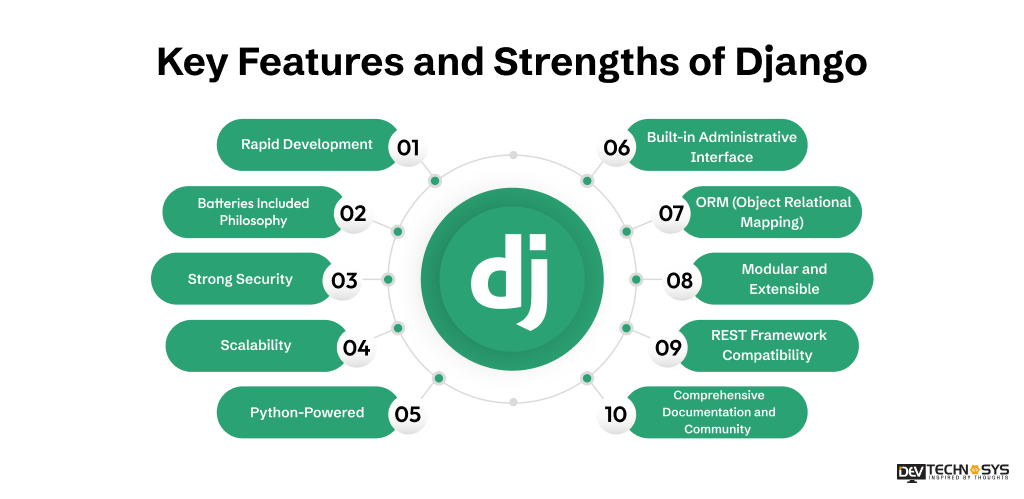
1. Rapid Development
Django is intended to let developers swiftly move applications from concept to completion, with little setup and repetitious writing.
2. Batteries Included Philosophy
It covers everything from authentication and ORM to admin panels, middleware, and templates, saving time on third-party dependencies.
3. Strong Security
Django safeguards against SQL injection, XSS, CSRF, and clickjacking by default. Django security features promote secure coding standards and use secure user authentication.
4. Scalability
Django scalability is ideal for high-traffic applications. It has been utilized by platforms such as Instagram, Pinterest, and Disqus to manage millions of members.
5. Python-Powered
Django takes use of Python’s simplicity, readability, and vast ecosystem for data science, machine learning, and automation.
6. Built-in Administrative Interface
Django automatically produces a robust admin interface for handling data, users, and models, saving time on CRUD tasks.
7. ORM (Object Relational Mapping)
Django’s ORM simplifies database management and allows developers to connect with databases via Python code rather than SQL.
8. Modular and Extensible
Django has a modular design through apps, making it simple to create scalable and maintainable applications with reusable components.
9. REST Framework Compatibility
Django REST Framework (DRF) enables the creation of strong, secure, and scalable RESTful APIs for mobile or frontend integrations.
10. Comprehensive Documentation and Community
Django is recognized for its great official documentation and active community, which help developers debug and progress.
Use Cases and Industries
Django’s power, security, and flexibility make it suitable for a wide range of industries. Here are detailed use cases:
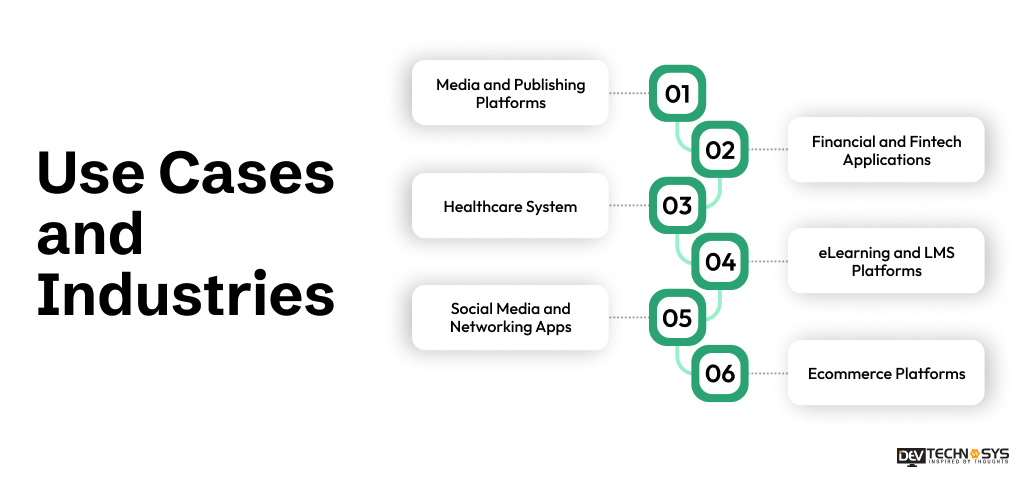
1. Media and Publishing Platforms
Django excels in powering content-heavy platforms such as news websites, blogs, and digital magazines. With its built-in admin panel and templating technology, it makes content administration easier for editors and authors.
Hire Django developers for fast-paced media contexts that require powerful publishing capabilities and easy integration with multimedia material.
2. Financial and Fintech Applications
Django’s robust security features make it an excellent choice for developing financial solutions like online banking portals, budgeting applications, and digital wallets.
Its dependable ORM and adaptability allow the secure handling of sensitive data, enabling financial services that demand compliance, scalability, and real-time data processing.
3. Healthcare System
Django is used to create HIPAA-compliant healthcare platforms such as EHRs, appointment scheduling systems, and telemedicine portals. Its security, scalability, and flexibility enable developers to design healthcare apps that securely handle sensitive patient data while adhering to regulatory regulations.
4. eLearning and LMS Platforms
Django’s educational platforms and learning management systems include course development tools, user role administration, quizzes, and video integration.
Django development company says that it is ideal for educational institutions and EdTech firms looking to provide customized, interactive, and data-driven learning experiences to students and instructors.
5. Social Media and Networking Apps
Django can handle complicated social networking features including user profiles, chat, content feeds, and alerts. Django Channels also supports real-time communication.
This makes it ideal for creating interactive platforms where performance, user engagement, and scalability are vital to long-term growth and stability.
6. Ecommerce Platforms
Django can power safe, customized eCommerce systems that include product catalogs, shopping carts, payment interfaces, and order management.
Though not usually utilized in retail, it is popular in B2B commerce or specialized markets where control, customisation, and interaction with analytics or inventory systems are critical.
Laravel Vs Django: Comparison for Better
Here’s a clean and professional comparison table for Laravel vs Django: Which is Better in 2025?
| Criteria | Laravel | Django |
| Language | PHP | Python |
| Architecture | MVC (Model-View-Controller) | MVT (Model-View-Template) |
| Performance | Good for most use cases | Slightly faster due to Python’s efficiency |
| Learning Curve | Moderate | Easy (especially for Python developers) |
| Development Speed | Fast with Artisan CLI and built-in tools | Very fast due to “batteries-included” philosophy |
| Security | Strong (manual configuration needed) | Excellent (secure by default)
|
| Admin Interface | Requires third-party packages | Comes built-in and ready to use |
| REST API Support | Good with Laravel API resources and packages | Excellent with Django REST Framework (DRF) |
| Templating Engine | Blade | Django Templates |
| Community Support | Large and active | Strong, mature, and well-documented |
| Scalability | High, especially with Laravel Octane | Enterprise-ready and proven in large-scale apps |
| Deployment | Requires configuration (Forge, Vapor, etc.) | Simpler with Docker, Heroku, or WSGI |
| Third-Party Packages | Rich ecosystem (Packagist) | Large ecosystem (PyPI, Django packages) |
| Use Case Strength | Best for eCommerce, CMS, B2C apps | Best for data-driven apps, SaaS, and enterprise |
| Best For | Custom websites, startups, and rapid development | Enterprise apps, secure platforms, and data-heavy apps |
In-depth Comparison Between Django Vs Laravel
Choosing the right web framework between Laravel vs Django, requires a deep dive into performance, security, scalability, and development speed. This in-depth comparing Laravel and Django, highlights the core differences, strengths, and ideal use cases to help developers and businesses select the best framework for their specific project needs.
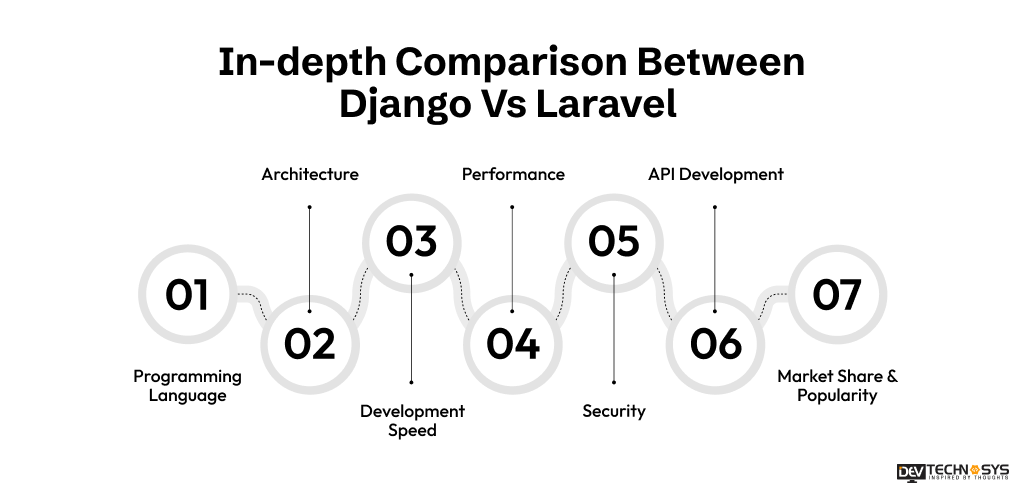
1. Programming Language: Django Vs Laravel
- Django: Built on Python, known for its readability, simplicity, and extensive ecosystem for AI, data science, and automation.
- Laravel: Built on PHP, a widely-used server-side scripting language, especially popular in web development trends.
Verdict: Choose Django if your team is skilled in Python or you need strong data processing. Choose Laravel if you’re working in a PHP-based environment.
2. Architecture: Django Vs Laravel
- Django: Uses the MVT (Model-View-Template) architecture, which is similar to MVC but relies heavily on its built-in templating engine and conventions.
- Laravel: Follows the MVC (Model-View-Controller) architecture, promoting separation of concerns and easier code organization.
Verdict: Both offer robust architectures. Hire dedicated developers to choose based on personal or team preference in handling logic and templating.
3. Development Speed: Django Vs Laravel
- Django: Adopts a “batteries-included” philosophy, offering most features (ORM, admin, authentication, etc.) out of the box.
- Laravel: Accelerates development with tools like Artisan CLI, Eloquent ORM, and Blade templates, but may require third-party packages for full-stack functionality.
Verdict: Django offers faster setup and fewer dependencies for full-featured apps.
4. Performance: Django Vs Laravel
- Django: Typically performs faster due to Python’s lightweight syntax and runtime efficiency.
- Laravel: Laravel performance well but may require tuning and caching layers for high-traffic sites.
Verdict: Django generally edges ahead in performance, especially for data-heavy applications.
5. Security: Django Vs Laravel
- Django: Is secure by default, providing protection against common threats such as SQL injection, XSS, CSRF, and clickjacking.
- Laravel: Hire web developers to integrate security features like CSRF protection, hashed passwords, and input sanitization, but some must be configured manually.
Verdict: Django is the winner in out-of-the-box security.
6. API Development: Django Vs Laravel
- Django: Uses Django REST Framework (DRF), widely regarded as one of the most powerful tools for building RESTful APIs.
- Laravel: Supports APIs using API Resources, middleware, and packages like Laravel Sanctum or Passport.
Verdict: Django + DRF offers the edge in API development for large, scalable systems.
7. Market Share & Popularity: Django Vs Laravel
Global Usage:
- Laravel: Approximately 3% market share among best web frameworks globally.
- Django: Approximately 1% market share in the United Kingdom.
Regional Popularity:
- Laravel: Dominates in regions like Bangladesh, holding a 62.5% market share.
- Django: Maintains a strong presence in Python-centric communities and enterprises.
Community Engagement:
- Laravel: Over 203k questions tagged with “Laravel” on StackOverflow, indicating a large and active community.
- Django: Over 304k questions tagged with “Django” on StackOverflow, reflecting its widespread use and community support.
What Popular Apps Are Built with Laravel?
Laravel is a powerful PHP framework that has been adopted by numerous prominent companies across various industries for building scalable and secure web applications. Here’s an overview of some notable organizations utilizing Laravel:
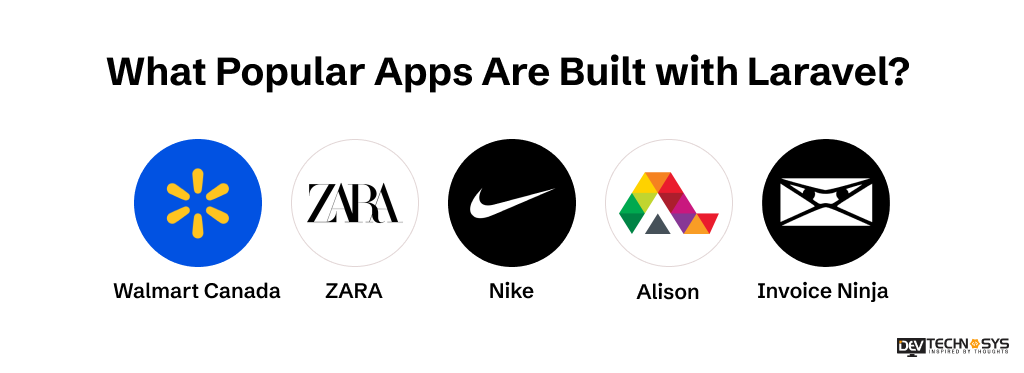
1. Walmart Canada
Walmart Canada uses Laravel to enhance its e-commerce operations, ensuring smooth performance, scalability, and efficient management of online orders.
Laravel powers features like real-time inventory tracking, secure checkout, and responsive interfaces, helping the retailer deliver a seamless shopping experience to millions of customers across the country through its digital platform.
2. ZARA
Zara utilizes Laravel to manage its online store, focusing on real-time inventory updates, seamless user experience, and secure payment processing. The framework supports Zara’s need for rapid development and efficient backend operations, aligning with its fast-paced fashion and retail strategy.
3. Nike
Nike leverages Laravel to power parts of its e-commerce infrastructure, enabling efficient product management, secure transactions, and scalable backend operations.
Laravel’s flexibility supports Nike’s dynamic marketing campaigns and global user base, ensuring a reliable, fast, and adaptive online shopping experience.
4. Alison
Alison, a global online learning platform, uses Laravel to deliver free courses efficiently across various subjects. Laravel powers its user management, course delivery, and assessment systems, ensuring a secure, scalable, and user-friendly experience for millions of learners worldwide.
If you’re planning to build a similar platform, understanding the cost to hire Laravel developers is crucial for effectively budgeting your project and ensuring high-quality development.
5. Invoice Ninja
Invoice Ninja, an open-source invoicing and billing platform, is built with Laravel. It offers freelancers and small businesses tools for managing invoices, payments, time tracking, and expenses. Laravel’s flexibility and scalability enable Invoice Ninja to provide robust and customizable features for users.
What Popular Apps Are Built with Django?
Django powers some of the world’s most popular and high-traffic applications, including Instagram, Pinterest, and Disqus. Known for its scalability, security, and flexibility, Django supports complex data management, seamless user experiences, and rapid development, making it a top choice for modern web app development with Laravel and Django.
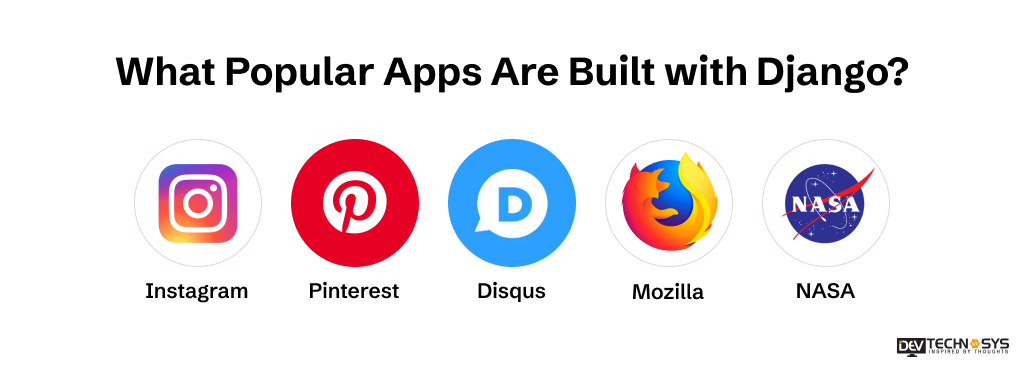
1. Instagram
Instagram, the world’s most popular social media site, was first constructed using Django. Django can handle millions of users, images, and conversations. The platform enables sophisticated database management, security, and scalability, which are critical for Instagram’s rapid expansion and user engagement.
2. Pinterest
Pinterest, the image-sharing and social networking website, uses Django to manage its large database and online traffic. Django’s scalability and flexible design enable features such as pinning, user interactions, and suggestions, ensuring a seamless and responsive experience for millions of users worldwide.
3. Disqus
Disqus, a prominent commenting system, utilizes Django to manage millions of users and comments on thousands of websites. Django’s security features, scalability, and simplicity of interaction with third-party systems enable Disqus to retain high speed while providing a safe and responsive experience for users.
4. Mozilla
Mozilla, the creator of Firefox, utilizes Django for a variety of internal tools and online applications. Django’s adaptability meets Mozilla’s requirements for strong, scalable solutions, allowing the team to maintain safe, efficient, and user-friendly systems for a wide range of services. If you’re looking to build similar systems, understanding the cost to hire Django developers is essential to ensure you can effectively budget for development and maintenance.
5. NASA
NASA utilizes Django for a variety of internal applications, including massive datasets and advanced data processing. The framework’s scalability and robust data management features enable NASA to handle and analyze large volumes of scientific data while assuring safe and efficient online apps for mission-critical activities.
Conclusion
In conclusion, both Laravel Vs Django are powerful frameworks, each with its strengths. Laravel excels in PHP-based web applications, offering an elegant syntax, robust tooling, and flexibility for rapid development. On the other hand, Django is a top choice for Python developers, known for its scalability and security.
Choosing between them depends on your project’s specific needs. For those seeking expert development services, a Laravel development company in USA can help harness the full potential of Laravel for building dynamic and scalable web applications tailored to your business goals.
Frequently Asked Questions
1. What is the Difference Between a PHP Framework Vs Python Framework?
A PHP framework, like Laravel, is optimized for building web applications with PHP, while a Python framework, like Django, leverages Python’s simplicity and scalability.
PHP frameworks are often preferred for web-specific projects, while Python frameworks excel in versatility and data-heavy applications.
2. What is the Difference Between Laravel ORM Vs Django ORM?
Laravel ORM (Eloquent) and Django ORM both simplify database interaction, but Eloquent uses PHP with a focus on relationships, while Django ORM leverages Python, emphasizing simplicity, scalability, and tight integration with Django’s framework.
3. Which is Better for Rapid Web Development, Laravel Vs Django?
Both frameworks excel at rapid development, but Laravel’s built-in tools like Blade templating and Eloquent ORM allow for faster prototyping in PHP, while Django offers a high level of efficiency in Python.
4. Which Framework is More Suitable for Startups, Laravel Vs Django?
Laravel is a popular choice for startups due to its rapid development, ease of use, and large number of pre-built tools. Django is also a great choice, especially for data-heavy applications or those needing Python’s versatility. Choose according to your requirements for Laravel or Django for startups.
5. Which Framework is Better for Building Enterprise Applications, Laravel Vs Django?
Django may have the edge for large-scale enterprise applications, especially those requiring complex data processing or machine learning, while Laravel is well-suited for developing feature-rich applications with high customization needs.
